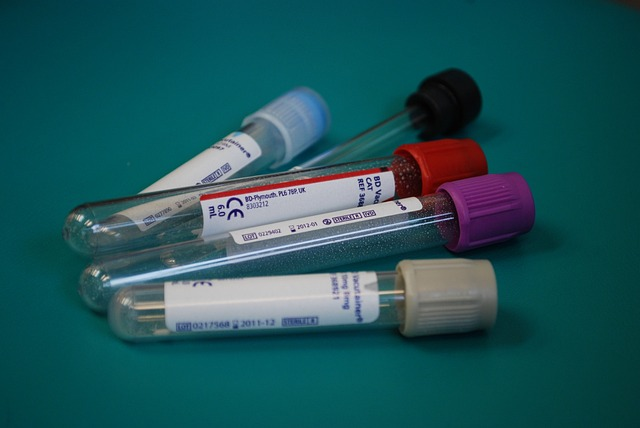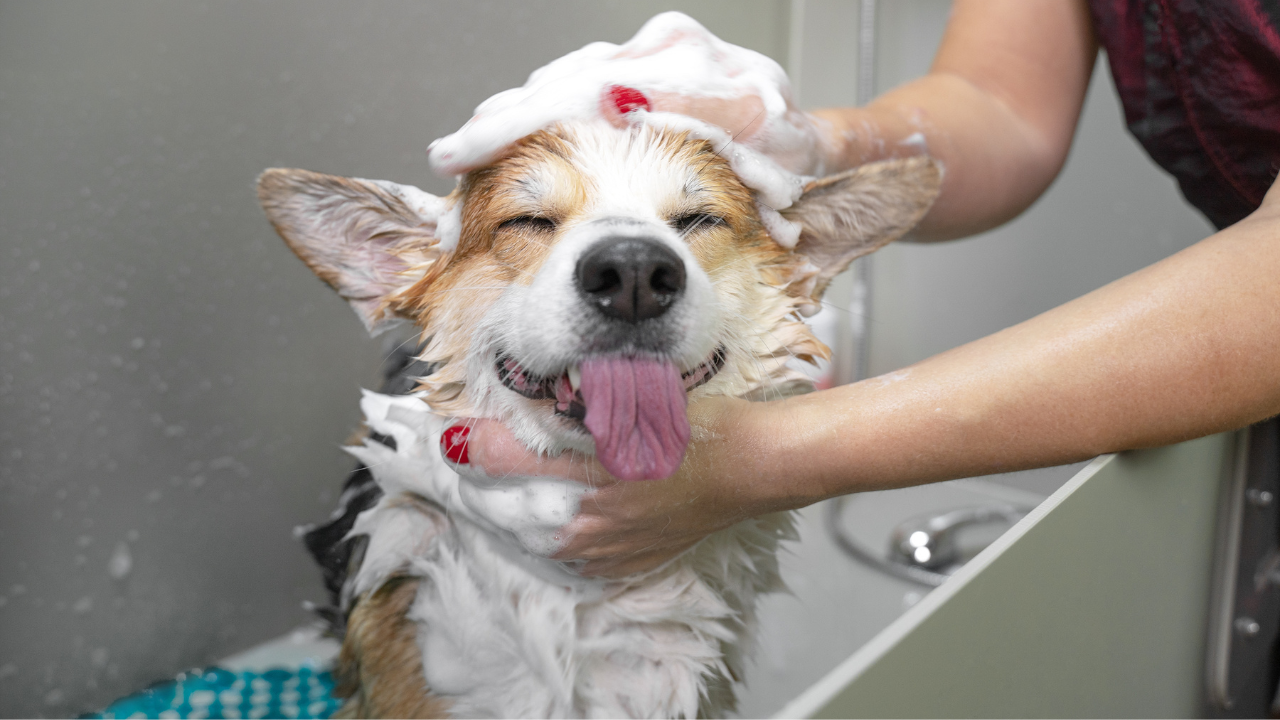
Your dog's itchy skin is the number one reason you will end up at the veterinarian according to analysis of the most common claims submitted to Nationwide pet insurance.In this blog post we will review environmental allergies and some ways to cope with them as naturally as possible.
Seasonal Allergies/Atopic dermatitis
So you ruled out food allergies , and fleas are not the problem. Once these skin conditions are ruled out you are left with environmental allergies which are typically seasonal. They include pollen, mold, dust mites, and basically anything that your pet can breathe or come in contact with. Contact allergies include cleaning agents, bedding, and other things your pet can come in contact with and develop irritated skin.
Diagnosing environmental allergies

After excluding flea, food and contact allergies you are left with the diagnosis of environmental allergy as the cause of your pet or dog's itch and frequent scratching. Veterinarians can run intradermal skin testing or run blood tests to detect the culprits. Such testing can be expensive, and you may try some interventions first to see if you can lesson your dog's itchy skin. And then of course, there is the possibility of multiple causes of allergic dermatitis...
So hang in there as we have some interventions that just might save the day! From avoiding those itch-inducing triggers to slathering on some soothing creams and lotions, we've got you covered.
How Diet Impacts Your Dog's Health
Just as for ourselves, the most important influence on your pet's condition is the diet you feed. Unfortunately, many commercial pet foods are packed with fillers, artificial additives, and an imbalanced ratio of Omega-3 to Omega-6 fatty acids. This imbalance can lead to inflammation and contribute to the development of allergic symptoms in dogs. An inflammatory diet is much more common than actual food allergies.

Options to Alleviate Allergic Symptoms:
- Switch to a Homemade Pet Meal: Using high quality ingredients in a balanced diet allows you to have complete control over what your dog consumes.
- Transition to a Raw Food Diet: Fresh, unprocessed foods can help reduce inflammation and minimize allergic reactions.
- Balance Omega-3 and Omega-6 Ratio: Increase your dog's intake of Omega-3's, found in fish oil supplements or fatty fish like salmon. Balancing Omega-3 to Omega-6 ratio in their diet can help reduce inflammation and alleviate allergic symptoms.
- Consider Probiotics and Digestive Enzymes: Probiotics and digestive enzymes can promote a healthy gut microbiome in dogs, enhancing their digestion and immune system function. Remember that most immune cells in the body reside in the gut, so we can't ignore it. Focusing on gut health can alleviate allergic reactions by combatting leaky gut, which can contribute to severe itching.
- Incorporate Anti-Inflammatory Herbs: Some herbs, such as turmeric and ginger, have natural anti-inflammatory properties. You can also add anti-oxidant rich foods such as blueberries.
- Lesson exposure of your dog's skin to allergens: Regularly clean your dog's living environment to minimize exposure to allergens such as dust mites, pollen, and mold. Vacuuming, washing bedding, and using air purifiers can help reduce allergy triggers. Wipe down paws and belly if your dog is out in a dusty environment. Bathing with a soap free shampoo minimizes allergens on the skin.
- Consult with a Holistic Veterinarian: When dealing with allergic symptoms, it's crucial to seek professional guidance. A holistic veterinarian trained in natural therapies such as herbal medicine and natural nutrition can add these to the treatment plan before resulting to prescription steroids or a highly processed prescribed diet.
10 Holistic Interventions for Allergic Skin Diseases

Allergic dermatitis treatment options should be multimodal as there is no quick fix for an itchy dog ever. You can't eliminate all of the environmental factors in your pet's life. Once you've done a diet trial, and insect control, and eliminated infectious causes of itching such as sarcoptic mange you are left with lowering the threshold of your dog's itchiness with as many natural alternatives as possible. Consider the following alternatives to help avoid prescription steroids, immune compromising drugs, and antibiotics.
#1 CBD For Your Dog Itching? What!?
You hear about CBD for just about everything. I once had a client ask if they could give it to their puppy as a supplement for not particular reason other than they heard it was good for many dogs. It has been studied and reported in major veterinary journals and several other studies that CBD does in fact decreases excessive scratching (1). You can use topical or oral CBD. Just make sure there is no THC in the product. Ask your veterinarian for a dose but most suggest 1-2 mg/kg twice daily. Make sure you choose a THC free brand (generally less than 0.3% is considered ok) and best if it's third party analyzed for purity and quality.
#2 A Soothing Chamomile Soak
Brew a strong cup of chamomile tea, let it cool, and use it as a soothing soak for your dog's itchy skin. Chamomile has anti-inflammatory properties and can help reduce irritation1.
#3: A Soothing Epsom Salt Bath
Add Epsom salt to warm water and give your dog a bath. The magnesium sulfate in Epsom salt can relieve itching caused by allergic dermatitis. Use care not to allow your pet to drink the soak solution as the magnesium has a strong laxative effect.
#4 Colloidal Oatmeal
Mix colloidal oatmeal with water to create a paste, and apply it to your dog's itchy areas. Colloidal oatmeal has anti-inflammatory properties and can soothe irritated skin.
#5 Bathing Regularly
Dogs do not need to be bathed typically (unless they've run into a skunk or they have a skin condition). Bathing too often actually create a skin condition by depleting their skin and coat of it's natural oils. In general, a soap free shampoo should be used. Bathing physically rinses off environmental allergens off the fur and can provide itch relief. Make sure you do not create dry skin by doing this.

#6 Topical OTC remedies
Cortisone or Benadryl/diphenhydramine cream can provide some relief for intense scratching. Consider applying it and doing a cool compress after to distract them from licking/ingesting it.
#7 Antihistamines/herbal remedies over steroids and topical antibacterial/antifungal treatments over oral treatments
Judicious use of antibiotics and antifungals is important in a world where so may skin infections are becoming resistant to them. Ask your veterinarian for an antihistamine dose for your pet. It's nice to know a Benadryl/diphenhydramine dose for your pet in case they have an insect bite or bee sting that causes an allergic reaction so that you can give it until you can get help for an allergic reaction.
#8 Cool Compress For Skin Allergies
You can use a 50:50 mixture of apple cider vinegar and water. Soak a towel in it and squeeze out the excess. Put in the freezer and apply to affected areas using care not to get it in eyes.
#9 Coconut oil
Coconut oil is antibacterial and antifungal. You can apply a thin film directly to inflamed skin.

#10 Aloe Vera Gel
Apply 100% pure aloe vera gel to your dog's hot spots. Aloe vera has cooling and healing properties that can provide relief from itching.
What About Tea Tree Oil?
Tea tree oil has antimicrobial properties and can help relieve itching caused by skin infections, however, it has an strong astringent effect which may dry skin excessively and cause even more irritation to itchy skin.

Antihistamines/Herbal remedies over steroids
If your dog is miserable it might be helpful to try some antihistamines. They do not work for all dogs and cats but they may help decrease the allergy threshold until you and your veterinarian decide if you need a prescription. That being said, do not wait to give them until your furry friend is a 9/10 if you were to rate the level skin irritation. You want to start them before your dog is miserable.
Remember, these at-home remedies are not a substitute for professional veterinary care. If your dog's itching persists or worsens, it is important to consult with a veterinarian to determine the underlying cause and create an appropriate treatment plan.
In conclusion, a well-balanced diet is the foundation of your dog's health. By focusing on quality ingredients, balancing Omega-3 to Omega-6 fatty acids, and exploring natural remedies, you can reduce inflammation, alleviate allergic symptoms, and enhance your furry friend's overall well-being.
Remember, the key is dealing with skin disorders and allergies is to provide a diet that supports their unique nutritional requirements while minimizing exposure to potential allergens.
Lastly, treating itchiness before it becomes over the top will likely keep you out of the veterinarians office. Be proactive and treat external bacterial and fungal infections with topical agents and avoid the use of oral antibiotics whenever possible.
Reference
The Canadian Medical Journal: Effects of cannabidiol without delta-9-tetrahydrocannabinol on canine atopic dermatitis: A retrospective assessment of 8 cases. Volume 63(4):April 2022










